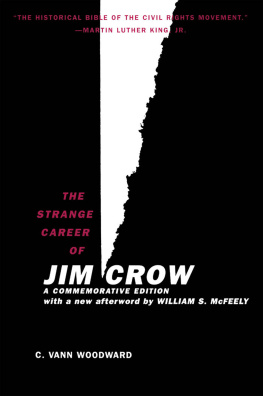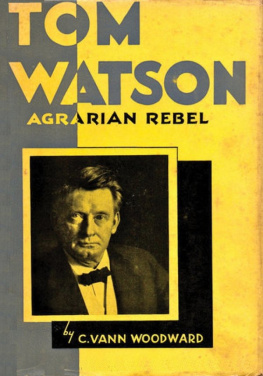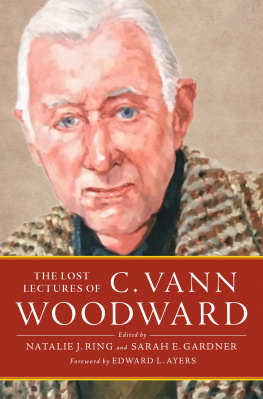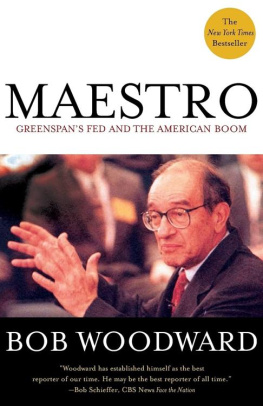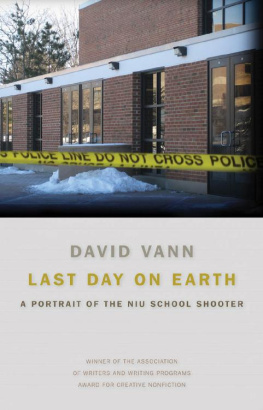The Letters of C. Vann Woodward
THE LETTERS OF
C. Vann Woodward
EDITED BY
Michael OBrien

Published with assistance from the Kingsley Trust Association Publication Fund established by the Scroll and Key Society of Yale College; and from the foundation established in memory of James Wesley Cooper of the Class of 1865, Yale College.
Copyright 2013 by Michael OBrien.
Letters by C. Vann Woodward copyright 2013 by Yale University.
All rights reserved.
This book may not be reproduced, in whole or in part, including illustrations, in any form (beyond that copying permitted by Sections 107 and 108 of the U.S. Copyright Law and except by reviewers for the public press), without written permission from the publishers.
Yale University Press books may be purchased in quantity for educational, business, or promotional use. For information, please e-mail sales.press@yale.edu (U.S. office) or sales@yaleup.co.uk (U.K. office).
Designed by James J. Johnson.
Set in Bulmer type by Integrated Publishing Solutions, Grand Rapids, Michigan.
Printed in the United States of America.
Library of Congress Cataloging-in-Publication Data
Woodward, C. Vann (Comer Vann), 19081999.
[Correspondence]
The letters of C. Vann Woodward / edited by Michael OBrien.
pages cm
Includes bibliographical references and index.
ISBN 978-0-300-18534-8 (hardcover : alk. paper) 1. Woodward, C. Vann (Comer Vann), 19081999Correspondence. 2. HistoriansUnited StatesBiography. 3. Southern States
Historiography. I. OBrien, Michael, 1948 April 13 II. Title.
E175.5.W66A4 2013
975 .007202dc23
2013011897
A catalogue record for this book is available from the British Library.
This paper meets the requirements of ANSI/NISO Z39.481992 (Permanence of Paper).
10 9 8 7 6 5 4 3 2 1
For Steven Stowe in friendship
Contents
Introduction
The rationale for publishing letters varies. There are a few whose letters justify publication because their author had a remarkable gift for the form, but perhaps little else. Madame de Svign would occasion scant interest for her quiet routines (reading, visiting a salon, listening to a nightingale) as a lesser French aristocrat of the late seventeenth century. But her letters were exquisitely good at describing her world, which contained thosethe Bourbon royal family, Madame de la Fayette, La Rochefoucauldwho then cut a greater figure in the world than the widow bereft of her child, but who now seem lesser than the woman who but scribbled. There are then those who are regarded as immensely important, for sundry reasonsruling an empire, writing an opera, or examining strange animals on the Galapagosand who happened to write letters, not especially well, but they have been published nonetheless because every scrap of Lincoln, Mozart, and Darwin is felt to be indispensable. Next, there is a handful of those who are truly great, as Stephen Spender would fantastically have it, in both life and letters, but these are very, very few. Cicero and Voltaire certainly, Jefferson perhaps. Lastly, there are those who are significant enough that the world cares about them, whether or not they wrote an engaging epistle. If they did not, the letters stay in archives and are used only by the specialized scholar. If they did, the letters get published. This last is C. Vann Woodwards case.
To be sure, the bubble of reputation can burst after death. This has not happened to Woodward, though his nachleben is yet young.
Taken all around, if one were to play the game of ranking the greatest American historians since the birth of the republic, it is probable that many cognoscenti would put him, probably not in the top ten, but perhaps in the top twenty, somewhere below Henry Adams, above Vernon Parrington, and around about Frederick Jackson Turner. If one were to play the more circumscribed game of ranking the greatest historians of the American South since the birth of the South, he would probably win hands down, at least if the voters knew what they were about.
Before settling to this introductions primary task of considering Woodwards lettersappraising the cogency of his historical interpretations is only a tangential concern here and has been well done elsewhereit will be helpful to begin with a bare summary of his life, some of whose facts will need to be elaborated later. Comer Vann Woodward was born in the tiny village of Vanndale, northeastern Arkansas, on November 13, 1908; he was the son of a school superintendent. In 1911 or 1912, his father moved to a similar job in Arkadelphia and then, two years later, to Morrilton (both in central Arkansas), where the younger Woodward grew up and attended the local high school, over which his father presided. In 1926, he went to study at Henderson-Brown College in Arkadelphia, but in 1928, when his father became dean of Emory Junior College in Oxford, Georgia, he transferred to Emory University in Atlanta, from which he graduated with a Ph.B. in 1930. Then, for a year he taught freshman English at the Georgia Institute of Technology, before (193132) completing an M.A. in political science at Columbia University. He returned to teach at Georgia Tech until laid off in 1933, then was mostly unemployed for a year or so, during which time he began to write a biography of Tom Watson, the Georgia Populist. In 1934, he secured a fellowship to pursue a doctorate in history at the University of North Carolina, from which he graduated in 1937. He then taught at the University of Florida (193739), the University of Virginia (193940) as a visiting professor, and Scripps College in southern California (194043) as an associate professor, before taking a commission in the U.S. Navy. In 1946 he went to Johns Hopkins University as an associate professor, becoming a full professor a year later, and he stayed in Baltimore until he moved to Yale in 1962 as Sterling Professor of History, a position from which he retired in 1977, though without leaving Connecticut, where he was to remain for the rest of his life, which ended on December 17, 1999. In December 1937 he married Glenn Boyd MacLeod (19101982), and in 1943 they had their only child, Peter Vincent, who predeceased his parents in 1969.
Along the way, C. Vann Woodward published nine books as sole author and edited a further six, as well as producing a small number of scholarly articles and hundreds of book reviews, all of which, cumulatively, Hence the extant historical literature was, for the most part, an affidavit for the established order.
Woodward turned all this on its head. To the contrary, his books suggested, Radical Reconstruction had been a worthwhile experiment in egalitarian politics, and its failure was to be regretted. The Compromise of 1877 was a squalid deal between white Northerners, anxious to retain national political power and willing to abandon inconvenient black allies, and white Southerners, keen to regain local political power and accept a federal economic patronage that confirmed the Souths new status as a colonial economy. The region, black and white, after 1877 was not pulling together but was riven by savage class, racial, and economic tensions,
Understanding this accomplishment has, of necessity, so far proceeded by critics reading Woodwards writings. Reading his private papers is another route, now available. But these papers have a form, mostly shaped by Woodward himself, which alternately facilitates and constrains what it is possible to understand.
Woodward liked to write letters and was a magpie about papers. There are many thousands of documents, mostly in the collection of his papers held by the Manuscripts and Archives division of the Yale University Library, which had invited him to donate them soon after his retirement. To a great extent, the papers seem to replicate how he kept his own files during his lifetime. There are, firstly, boxes (Series I) which contain letters to and from individuals and organizations; these are organized, first, alphabetically, and then chronologically. Series II collects his writings, arranged in groups (shorter writings, books, reviews, unpublished works, and lectures); these boxes mingle manuscripts and his correspondence with editors and friends asked to read drafts. Series III concerns subjects and is eclectic, while Series IV is designated research and is, again, eclectic (note cards, applications for research grants, correspondence with archives, copies of historical documents). Series V collects papers relevant to his time at Yale (departmental matters, letters with administrative officials, the record of his terms of employment). Series VI is dubbed personal, by which is mostly meant family documents (including some from the nineteenth century), but also diaries, material to do with students, some job offers, photographs, and clippings.
Next page


